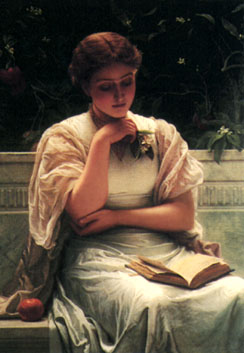from AN ESSAY ON CRITICISM
A little learning is a dangerous
thing;
Drink deep, or taste not
the Pierian spring:
There shallow draughts intoxicate
the brain,
And drinking largely sobers
us again.
Fired at first sight with
what the Muse imparts,
In fearless youth we tempt
the heights of arts,
While from the bounded level
of our mind,
Short views we take, nor
see the lengths behind;
But more advanced, behold
with strange surprise
New distant scenes of endless
science rise!
So pleased at first, the
towering Alps we try,
Mount o'er the vales, and
seem to tread the sky,
Th' eternal snows appear
already pass'd,
And the first clouds and
mountains seem the last:
But those attain'd, we tremble
to survey
The growing labours of the
lengthen'd way,
Th' increasing prospect tires
our wandering eyes,
Hills peep o'er hills, and
Alps on Alps arise!
But most by numbers judge
a poet's song,
And smooth or rough, with
them, is right or wrong;
In the bright Muse though
thousand charms conspire,
Her voice is all these tuneful
fools admire;
Who haunt Parnassus but to
please their ear,
Not mend their minds; as
some to church repair,
Not for the doctrine, but
the music there.
These equal syllables alone
require,
Though oft the ear the open
vowels tire;
While expletives their feeble
aid do join;
And ten low words oft creep
in one dull line:
While they ring round the
same unvaried chimes,
With sure returns of still
expected rhymes.
Where'er you find "the cooling
western breeze,"
In the next line, it "whispers
through the trees":
If crystal streams "with
pleasing murmurs creep,"
The reader's threaten'd (not
in vain) with "sleep":
Then, at the last, and only
couplet fraught
With some unmeaning thing
they call a thought,
A needless Alexandrine ends
the song,
That, like a wounded snake,
drags its slow length along.
Leave such to tune their
own dull rhymes, and know
What's roundly smooth, or
languishingly slow;
And praise the easy vigor
of a line,
Where Denham's strength,
and Waller's sweetness join.
True ease in writing comes
from art, not chance,
As those move easiest who
have learn'd to dance,
'Tis not enough no harshness
gives offence,
The sound must seem an echo
to the sense.
Soft is the strain when Zephyr
gently blows,
And the smooth stream in
smoother numbers flows;
But when loud surges lash
the sounding shore,
The hoarse, rough verse should
like the torrent roar.
When Ajax strives, some rocks'
vast weight to throw,
The line too labours, and
the words move slow;
Not so, when swift Camilla
scours the plain,
Flies o'er th'unbending corn,
and skims along the main.
Hear how Timotheus' varied
lays surprise,
And bid alternate passions
fall and rise!
While, at each change, the
son of Lybian Jove
Now burns with glory, and
then melts with love;
Now his fierce eyes with
sparkling fury glow;
Now sighs steal out, and
tears begin to flow:
Persians and Greeks like
turns of nature found,
And the world's victor stood
subdued by sound!
The powers of music all our
hearts allow;
And what Timotheus was, is
Dryden now.


